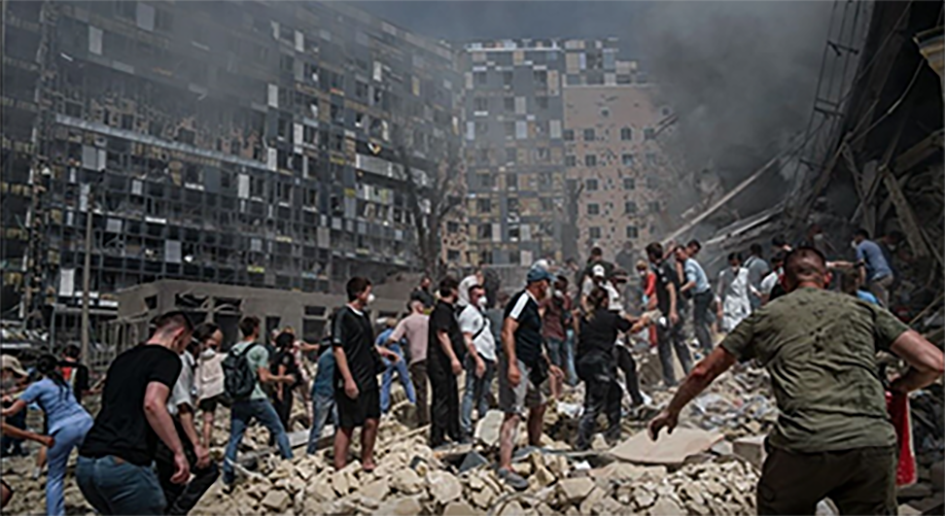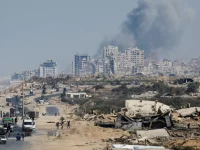War. Ukraine: Three Years On

BAD ANNIVERSARY Matthias Schmale, Resident Coordinator and Humanitarian Coordinator in Ukraine, speaking from Kyiv, said Monday, 24 February, marked the third anniversary of the Russian Federation’s full-scale war on Ukraine, which was a sombre milestone. All children born in Ukraine since 2014 had never experienced their country at peace. In 2024, there was a 30 per cent increase in civilian casualties compared to 2023, and the humanitarian situation was worsening, especially in front-line areas. Thirty-six per cent of Ukraine’s population, 12.7 million people, needed humanitarian aid in 2025. Winter made everything more dangerous, with attacks on energy infrastructure risking leaving hospitals and homes without electricity and heating during the coldest months of the year. There was also the hidden crisis of mental health, due to continuous attacks, leading to weakening resilience.
Mr. Schmale said he had identified several priorities for 2025; the first was support to the frontlines and delivering aid where it was needed most. Last year UN agencies and local non-governmental organizations continued delivering aid, with over 50 convoys bringing 580 metric tons of essential supplies to war-torn communities, and this would continue in 2025. The second priority was managing evacuations from front-line areas, where older people and those with disabilities faced immense challenges. The third priority was working with local organizations on emergency response to strikes. More than 600 national and local groups were on the scene, providing vital assistance right after strikes. The fourth priority was ensuring more durable solutions for internally displaced people. More than 10 million people remained uprooted, and some 3.7 million people were displaced inside Ukraine. In 2025, $2.6 billion was needed to sustain assistance for six million people. The international community was urged to continue being generous. Ukraine must not be forgotten, Mr. Schmale added.
Toby Fricker, United Nations Children’s Fund (UNICEF) Chief of Communication in Ukraine, speaking from an underground school in Zaporizhzhia, said that, according to a UNICEF-led survey released today, which gathered responses from 23,000 children, one in five children in Ukraine reported losing a close relative or friend since the escalation of the war three years ago. One in three children reported feeling so hopeless and sad that they could not do their usual activities. Three years into the full-scale war, more than 2,520 children had been killed or injured, according to UN-verified numbers. There was a 50 per cent increase in child casualties in 2024 compared to 2023. Around 780 health facilities and more than 1,600 schools have been damaged or destroyed, according to UN-verified data. In Odesa this week a health clinic providing care for 40,000 children, and a kindergarten serving 250 young children were severely damaged in an attack. Nearly 40 per cent of children across Ukraine studied only online or through a mixture of in-person and remote classes.
The impact on education had been immense. Assessments recorded an average learning loss of two years in some subjects. UNICEF had been supporting the rehabilitation of shelters to make them as safe as possible, training teachers and establishing catch-up classes to help children recover learning losses as quickly as possible. Children born when the escalation of war began were now turning three years old. They had spent their critical early years amid extreme stress and loss, putting them at higher risk of psychological disorders and poorer physical health throughout life. That’s why early intervention was so critical, like UNICEF-supported mobile teams, including counsellors who responded immediately after attacks, and home visits by nurses in frontline and other areas across the country that provided vital health and holistic care. Improving access to and the quality of services like health and education would help create an environment that people would want to returnto. A real and sustained peace was needed, in which every child could realize their rights.
Jarno Habicht, World Health Organization (WHO) Country Representative for Ukraine, said in 2017, one out of ten people in Ukraine said psychological stress was negatively impacting their health. In the most recent survey, in 2023, that number was six out of ten persons.
According to the latest WHO Health Needs Assessment, 25 per cent surveyed believed their access to medical services had worsened compared to the period before 24 February 2022. 82 per cent had experienced issues getting medicines, mainly due to price increases, and 35 per cent of the population were postponing care. Regional disparities persisted in the public health picture, with areas of increased vulnerability and conflict-affected areas facing greater difficulties due to security concerns and higher costs of medicines and services.
Since the start of full-scale war, WHO had documented over 2,209 attacks on health.
This year, in 2025, an estimated 9.2 million people in Ukraine would need some form of health assistance from humanitarian actors. WHO aimed to reach three million people, focusing on the most critical needs in key oblasts impacted, and collectively needed over $130 million to save lives. Despite the challenges, WHO had witnessed the health system’s transformation and recovery during the last three years. This was due to the extraordinary complementary financial support to health, including from donors, which was greatly appreciated. At the mark of three years of full-scale war, WHO continued to support Ukraine with response, recovery and development efforts, including through access to clean water and sanitation, mental health support and heating stations in hospitals. WHO had also trained over 8,000 healthcare workers, supported rehabilitation services, and was working with the Ministry of Health to drive vital reforms. Moving forward, it was vital to have stamina, solidarity, and support for the people of Ukraine.
Sofia Calltorp for United Nations Women, said the full-scale war had pushed an entire generation of Ukrainian women and girls backward in terms of rights, safety, and economic opportunities. In 2024 the number of killed and injured in Ukraine increased by 30 per cent, with 800 women losing their lives and more than 3,700 being injured. The vast majority of Ukrainian refugees and displaced persons were women, and 6.7 million women were in need of lifesaving humanitarian assistance. War-related distress had contributed to an increase in gender-based and domestic violence, as well as to the higher rates of depression among women and girls. Despite these hardships, Ukrainian women were showing extraordinary leadership. More than 68,000 women had joined the Armed Forces of Ukraine, with 5,000 actively serving in combat roles. Yet support to women remained severely underfunded; in 2022, less than one per cent of all international aid in support of recovery in Ukraine included a gender equality focus. Through the Women Peace and Humanitarian Fund, UN Women had directed over $20 million to 54 women-led and women’s rights organizations operating in the hardest-hit areas. There could be no lasting peace in Ukraine without women. The Organization called on all partners and decision-makers to renew support to women’s organizations.
Responding to questions, Matthias Schmale, Resident Coordinator and Humanitarian Coordinator in Ukraine, said the global situation was also contributing to the sombre mood in Ukraine. People were hopeful that the weapons would fall silent, but it was also clear they wanted justice. There was concern that with the priorities of ending the war, justice would fall off the table. This was causing a further deterioration of mental health.
Responding to further questions, Mr. Schmale said financial difficulties were increasing. Since 2022, 3.5 million jobs had been lost in Ukraine. It was worrying that cash assistance seemed to be excluded from the assistance the United States was considering reopening. When there was increasing poverty, cash was a major form of support which allowed people to meet urgent needs. There was concern about the funding freezes, yet discussions were ongoing, and some exemptions had been received. It was hoped the United States funding would become part of the equation. Last year, this made up 30 per cent of the humanitarian side, and it would have to be compensated. Discussions were ongoing with the Government and other partners.
Sofia Calltorp for UN Women, said over 76 per cent of returnees to Ukraine were women and girls, which was why it was important to look at their specific needs. UN Women were grateful for the funding received already, but there was still severe underfunding. The gender perspective was something that needed to be addressed.
Jarno Habicht, World Health Organization (WHO), Country Representative for Ukraine, said affordability for medical care had become more of an issue. Internally displaced persons had lower access to care and services. Poverty levels had increased tremendously during the war. Ukraine had been resilient; there were recovery projects and investment, and it was important that these continued. It was important to ensure that government services, including healthcare, would continue to be available. Mr. Habicht expressed concern at how this complimentary financing would continue.
Toby Fricker, United Nations Children’s Fund (UNICEF) Chief of Communication in Ukraine, said initiatives such as a social worker training hub and a new small-grants program had been launched, which would be critical for people returning to the country.
Matthias Schmale, Ukraine Assistant Secretary-General for the Office of the Coordination of Humanitarian Affairs (OCHA), said the full-scale invasion in 2022 violated the United Nations Charter and the territorial integrity of Ukraine. It was a violation of what the UN stood for.
Alessandra Vellucci for the United Nations Information Service (UNIS), said the Secretary-General had repeated several times that he wanted to see an end to the conflict, in line with the territorial integrity of Ukraine and international law. Mr. Fricker said the Government of Ukraine was committed to education across the country and had put a significant amount of budget towards the education system, including by building underground schools. Building the skills of children for the jobs of tomorrow was critical for the development of the country. Funding cuts had an impact on everyone, but the Organization continued to support efforts wherever they could in turning education around.










